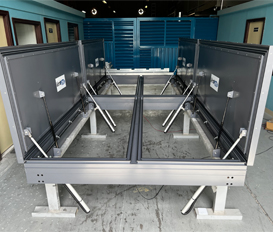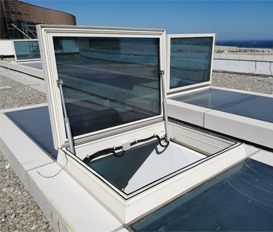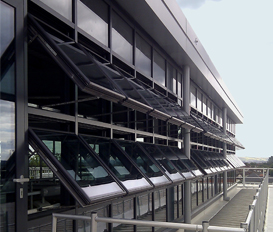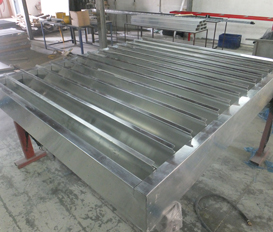- PO Box 77261, Al Quoz Industrial Area 3, Dubai, UAE
- info@ventline.ae

Natural smoke and heat exhaust ventilation systems (NSHEVS) are designed as safety equipment that would save lives and reduce the destruction of properties. It will work by the upward current of the fume atmosphere. The smokes produced by fire are to be discharged from inside to outside of the building by automatically or manually opening smoke ventilation systems. In the event of a fire, the fire raised the temperature of the room from ambient to hazardous zone. This creates heat buoyancy, which in turn generates a pressure difference within the room, in negative pressure at the floor level and positive pressure below the ceiling or under roof level.
The pressure difference causes the outside fresh air to flow in through the supply air jet stream openings in the lower level of the hall and air to flow out through NSHEV (Natural Smoke and Heat Exhaust Ventilators) in the upper roof area or wherever it was located.
NSHEVS TYPES/MODELS

SMOKELINE
(VTL-SLDF-300)
Roof Mounted Twin
Flap

SMOKELINE
(VTL-SLSF-300)
Roof Mounted Single
Flap

SMOKELITE
(VTL-SLWV-300)
Wall Mounted
Casement

FIRELINE
(VTL-FLSV-300)
Louvered
Ventilator
CONSTRUCTION & CONFIGURATION

Alloy 6063 T5/T6
Standards: - BS EN 12020-2-2008, BS EN 755-9-2008 & ASTM-B-221-12
Alloy 1100 / Alloy 3003 / Alloy 5005
Standards: - ASTM-B-209/209M
Single and double wall glazing up to 32mm (T)
Single layer or multilayer up to 48mm (T)
Rockwool - ASTM C167, ASTMC612, ASTM C871, UL723/ASTM E84, EN13501-1:2007 & EN ISO 1182-2010
24VDC Linear drive, 230Volts Actuator, Thermal latch & Pneumatic actuator
Standard : EN 12101-2
UL Tested fusible link
Powder Coating:- BS6496, AAMA2605-PVF2; AAMA2604-SDF,
AAMA2603-PEF ; Colors: RAL Standard
Anodizing:- BS EN ISO 7599:2010 (Matt / Metallic)

PERFORMANCE CHARACTERISTICS

The performance of NSHEVS is tested and certified complying with EN12101-2: 2003. The precise performance attribute will depend on the preferred dimension, control system, type of flap, and installation orientation CE Markings and Fire Safety Certification.
Request Catalog :

Performance Value
| Resistant to Heat (Annex G) | B300 30 |
| Aerodynamic Coefficient (Annex B) | Up to 0.70 |
| Reliability (Annex C) | Re 1000 (10,000 cycles) |
| Wind Load (Annex F) | Up to 9000 N/m² |
| Resistance to fire | E by EN 13501-1 |
| U value | Up to 0.20 W/m²K |
| Low-temperature class | T(00) to T(-15) |
| Air permeability | Class 4 by EN 12207 |
| Water tightness class | 9A by EN 14963 |
| Resistance to wind load | Class 5C by EN 12210 |
| Sound Rating | 35 to 49 dB Rw |
